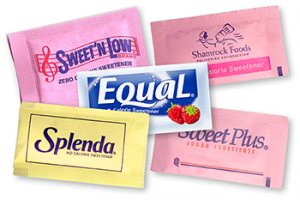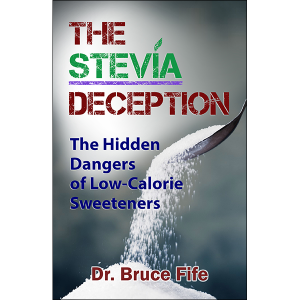 Do you eat foods and beverages sweetened with sugar substitutes to avoid sugar and help control calorie intake to manage your weight? Do you drink diet soda in place of regular soda? Honestly, have these measures ever helped you lose any weight? If you are like most people, the answer is “No.”
Do you eat foods and beverages sweetened with sugar substitutes to avoid sugar and help control calorie intake to manage your weight? Do you drink diet soda in place of regular soda? Honestly, have these measures ever helped you lose any weight? If you are like most people, the answer is “No.”
Oddly enough, replacing sugar with artificial sweeteners does not help with weight loss. It in fact, promotes greater weight gain!
When artificial sweeteners such as aspartame, saccharin, and sucralose were introduced, they were accompanied with great fanfare and promises that they would reduce calorie intake and promote weight loss. Theoretically, it seems logical they could help with weight loss. If you replace the sugar in your diet with zero-calorie sweeteners, you end up consuming fewer calories, and therefore, you should lose weight. In theory it makes sense. In reality it doesn’t work.
When artificial sweeteners were introduced they were hailed as a partial solution to our growing obesity problem. Since their introduction the obesity problem has turned into a full-blown epidemic. Ironically, the solution to the obesity problem has turned out to be one of the major causes of it!
While foods sweetened with artificial sweeteners may contain fewer calories than the sugar sweetened versions, they cause an increase in hunger that leads to excessive calorie consumption and weight gain.
A number of studies in both animals and humans have shown that artificial sweeteners tend to promote more weight gain than sugar does. The reason for this has been a mystery. A new study, however, offers insights as to why these sweeteners promote hunger and weight gain.
“There is a lot of discussion about how these sweeteners actually affect human health,” says Dr. Greg Neely, an associate professor of genomic at the University of Sydney in Australia and senior author of the new study. “Our data show that chronic consumption of [artificially sweetened foods] triggers a conserved neuronal fasting response and increases the motivation to eat.”1
The researchers began their work on fruit flies, giving them either a diet of food sweetened with sugar or sucralose, the sweetener found in Splenda, for 5 days. (Neely noted that sucralose was used as the artificial sweetener in part because fruit flies don’t seem to like saccharin, the sweetener used in Sweet’N Low.).
The researchers observed that the flies that had been fed the sucralose diet ate about 30 percent more calories than the ones that had been eating sugar. The researchers wanted to know what was going on in the flies’ brains to drive them to eat more.
Using molecular genetic approaches to study the activity of brain cells, the scientists found that the sucralose activated a “fasting response” in the flies’ brains. In other words, because the flies were consuming fewer calories when they were fed the sucralose, their brains did not recognize that they were eating enough calories. And so, to compensate for this perceived lack of calories in the food, the fasting response pathway in the brain triggered the flies to eat more.
The researchers found a neurotransmitter in the brain called neuropeptide F played a role in the fasting response in the fruit flies. Mice and humans have an analogous neurotransmitter, called neuropeptide Y.
The researchers conducted the same experiment using mice with a similar result; those mice that were fed sucralose-sweetened jellies ate more food than those that were not given the sucralose. However, when the researchers used genetically modified mice that did not have neuropeptide Y, sucralose had little effect on the animals’ appetite. In other words, neuropeptide Y played a role in how artificial sweeteners affected the animals’ appetites.
These new findings suggest that in both fruit flies and mice, sucralose promotes increased food intake. Since humans also have neuropeptide Y, that may explain why artificial sweeteners tend to promote weight gain in us too. Dr. Neely also noted that the flies consuming the artificial sweeteners also exhibited other symptoms, including hyperactivity, insomnia, and glucose intolerance. Glucose intolerance or insulin resistance is the landmark feature characteristic of type 2 diabetes.
This isn’t just a characteristic of sucralose, all artificial sweeteners seem to trigger the “fasting response” in our brains.2 Consuming foods and beverages sweetened with artificial sweeteners would not only promote increased appetite but also cravings, severely challenging the success of any diet. It appears that if weight loss or weight management is your goal, it is best to stay away from the artificial sweeteners.♦
References
- Wang, QP, et al. Sucralose promotes food intake through NPY and a neuronal fasting response. Cell Metab 2016;24:75-90.
- Yang, Q. Gain weight by “going diet?” Artificial sweeteners and the neurobiology of sugar cravings. Yale J Biol Med 2010;83:101-108.
by Dr. Bruce Fife

